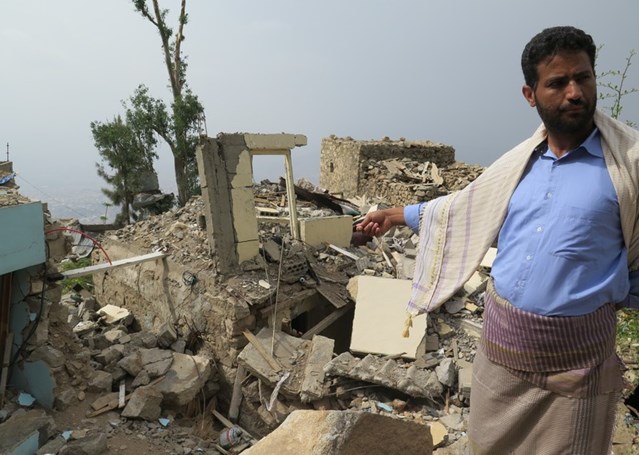War crimes have been covered up in Yemen and the UK risks complicity in “laws-of-war violations” due to its supply of bombs made in Scotland to Saudi Arabia, claims a new report.
Human Rights Watch (HRW) says that investigations in Yemen have been a “sham” and “deeply flawed” and that investigators with the Saudi-led coalition have covered up war crimes.
The report, entitled ‘Hiding Behind the Coalition: Failure to Credibly Investigate and Provide Redress for Unlawful Attacks in Yemen’, analyses the work of the coalition’s investigative body, the Joint Incidents Assessment Team (JIAT), over the past two years.
There have been hundreds of war crimes allegations levelled at Saudi Arabia and its coalition partners who have been fighting Houthi rebels in Yemen since 2015.
Many of these alleged war crimes have involved airstrikes on civilian targets. UK made aircraft and bombs from Scotland are used by the Royal Saudi Air Force.
The coalition uses smart bombs called Paveway IV missiles fitted with laser guidance systems made in Fife, some of which have been linked to alleged war crimes in Yemen.
Condemning JIAT’s investigations as falling “far short of international standards regarding transparency, impartiality, and independence”, HRW claims that investigators were doing “little more than covering up war crimes”.
HRW says JIAT has provided “deeply flawed laws-of-war analyses and reached dubious conclusions” with its investigations.
“For more than two years, the coalition has claimed that JIAT was credibly investigating allegedly unlawful airstrikes, but the investigators were doing little more than covering up war crimes,” said Sarah Leah Whitson, HRW Middle East director.
“Governments selling arms to Saudi Arabia should recognise that the coalition’s sham investigations do not protect them from being complicit in serious violations in Yemen.”
The report says that in 2016 JIAT ruled that a coalition attack on a water well in September – an assault that killed and wounded dozens of civilians – was an “unintended mistake”. But HRW found at least 11 bomb craters on a visit to the site.
JIAT also downplayed damage to civilian structures, the report says, contradicting physical evidence.
In 2015, for example, the coalition repeatedly bombed a residential complex in Mokha, killing at least 65 people and wounded dozens more, yet JIAT concluded the complex was “partly affected by unintentional bombing.”
Human Rights Watch video
The report says that despite coalition promises, there is no clear way for civilian victims or relatives to obtain redress from its forces. HRW says it followed up with victims of six out of 12 attacks for which JIAT had recommended assistance and no one had received anything.
The report also says that the coalition’s continuing “unlawful airstrikes” and “failure to adequately investigate alleged violations” puts weapons’ suppliers to the coalition – including the US, UK, and France – at risk of complicity in future unlawful attacks.
These countries should immediately suspend arms sales to Saudi Arabia, HRW argues, adding that Saudi and Emirati commanders, whose countries play key roles in coalition operations, could face possible criminal liability due to command responsibility.
“The failure of the coalition’s investigative body to carry out credible inquiries and take appropriate action reinforces the urgency for United Nations Human Rights Council members to renew and strengthen the UN inquiry into violations by all parties in Yemen,” Whitson said.
“The UN Security Council should consider imposing targeted sanctions on senior coalition commanders who share the greatest responsibility for serious repeated violations.”
Andrew Smith of Campaign Against Arms Trade (CAAT) said: “The humanitarian crisis in Yemen is one of the worst in the world, and is only getting even worse. It is a man-made crisis, and one which has been fuelled and exacerbated by Downing Street.
Smith maintained that the Saudi regime had caused much of the devastation and could not have done so “without the political and military support it has enjoyed from the UK, the US and other complicit governments”.
He added: “The war has also been a major business opportunity for Raytheon, and the other arms companies that have profited every step of the way. Arms company bosses don’t care where their arms are used, or who they are used against, all they care about is selling even more weapons, regardless of the terrible consequences.”
The Foreign Office insisted that it took reports of International Humanitarian Law (IHL) violations very seriously and called for all sides to adhere to the law. “It is important that the coalition conducts thorough and credible investigations into incidents where it is alleged that IHL has been breached,” said a spokesperson.
“Saudi Arabia has publicly stated that it investigates reports of alleged IHL violations and that lessons will be acted upon.”
The UK has been supplying the Saudi-led coalition with Paveway IV missiles produced by US arms firm Raytheon at its factory in Glenrothes.
Despite many allegations that hospitals and schools have been bombed by the coalition the UK government has repeatedly refused to suspend arms sales to the Saudis. The government is currently defending legal action brought by CAAT over these arms sales.
In 2016 we reported that fragments of a bomb found at the scene of an alleged war crime in Yemen linked to Raytheon in Scotland.
A code – 15090-2271709-3 MFR U07GO – engraved on the fragment revealed it was made by Raytheon and a sub-contractor called Border Precision, a firm based in Kelso before it closed down last summer.
At time of writing Royal Embassy of Saudi Arabia, in London, had not responded to our request for a comment.
Raytheon linked to another alleged war crime in Yemen – 31 dead














